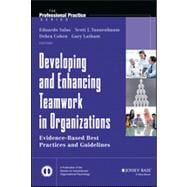
What is included with this book?
Eduardo Salas, PhD, is trustee chair and Pegasus professor of psychology at the University of Central Florida where he also holds an appointment as program director for the Human Systems Integration Research Department at the Institute for Simulation and Training.
Scott I. Tannenbaum, PhD, is president and cofounder of the Group for Organizational Effectiveness. He has provided advice, tools, and training to many organizations, including Fortune 100 companies and numerous government and military organizations.
Debra Cohen, Ph.D., SPHR, is the senior vice president of Knowledge Development for the Society for Human Resource Management and is responsible for the Society's Knowledge Development Division.
Gary Latham, PhD, is the Secretary of State Professor of Organizational Effectiveness in the Rotman School of Management at the University of Toronto. Gary is a past president of the Society for Industrial and Organizational Psychology (SIOP).
A division of the American Psychological Association and established in 1945, the Society for Industrial and Organizational Psychology (SIOP) is the premier association for professionals charged with enhancing human well-being and performance in organizational and work settings. SIOP has more than 7,000 members.
Foreword
The Editors
The Contributors
Part 1: Why Teamwork Matters in Organizations
Essay 1: Teamwork in Financial Institutions—Does It Really Matter? (Michael J. Castellana, CEO, SEFCU)
Essay 2: Do Teams’ Leaders Really Matter? (COL Casey Haskins, U.S. Military Academy, West Point)
Essay 3: Teamwork Matters (Peter J. Pronovost, Johns Hopkins University)
Essay 4: Making a Difference with Health Care Teams (Victor V. Buzachero, Scripps Health)
Essay 5: Developing Leaders on Any Team (George O’Leary, Head Football Coach, University of Central Florida)
Essay 6: Teamwork and Spaceflight—An Evolving Relationship (Daniel W. Tani, Astronaut, NASA)
Part 2: The Organization and Its Influence
Chapter 1: Silent Killers of Team Performance: How Honest, Collective, and Public Conversations Can Overcome Them (Michael Beer, Harvard Business School and TruePoint)
Chapter 2: How Organizational Process Maturity Improved Software Team Performance (Bill Curtis, CAST Software)
Chapter 3: Leading a Team to a Major Technological Development (Kazem Rassouli, University of Toronto, Rotman School of Management)
Part 3: The Team Leaders
Chapter 4: Building Great Leadership Teams for Complex Problems (Ruth Wageman, Harvard University)
Chapter 5: Developing High-Impact Teams to Lead Strategic Change (Kate Beatty and Roland B. Smith, Center for Creative Leadership)
Chapter 6: Leading Executive Teams: The Good, the Bad, and the Ugly (Susan R. Meisinger, Society for Human Resource Management)
Chapter 7: Leading from the Helm: Lessons from America’s Cup Sailing Teams (Mark A. Clark, American University)
Part 4: The Organizational Context
Chapter 8: Virtual Teams: The How To’s of Making “Being Virtually There” Successful (Debra J. Cohen and Alexander Alonso, Society for Human Resource Management)
Chapter 9: Trust and Conflict at a Distance: How Can I Improve Relational Outcomes in Distributed Work Groups? (Jeanne Wilson, The College of William and Mary)
Chapter 10: Teamwork Improvement in Health Care: A Decade of Lessons Learned Every Organization Should Know (Sandra A. Almeida, MD, LLC, Heathcare Consulting, Heidi King, TRICARE Management Activity, and Mary L. Salisbury, The Cedar Institute, Inc.)
Chapter 11: Why Teamwork Matters: Enabling Health Care Team Effectiveness for the Delivery of High-Quality Patient Care (Joanne Lyubovnikova, Aston University, and Michael A. West, Lancaster University)
Chapter 12: Rethinking Team Diversity Management: Evidence-Based Strategies for Coping with Diversity Threats (Mirko Antino, Universidad Complutense de Madrid, Ramon Rico, Universidad Autonama de Madrid, Miriam Sánchez-Manzanares, Universidad Carlos III de Madrid, and Dora C. Lau, Chinese University of Hong Kong)
Chapter 13: High Performance in Temporally Separated Team Work (J. Alberto Espinosa, Kogod School of Business, American University)
Part 5: The Assessments, Applications, and Interventions for Teams
Chapter 14: Designing, Delivering, and Evaluating Team Training in Organizations: Principles That Work (Megan E. Gregory, Jennifer Feitosa, Tripp Driskell, and Eduardo Salas, Department of Psychology, Institute for Simulation and Training, University of Central Florida, and William Brandon Vessey, EASI/Wyle, NASA Johnson Space Center)
Chapter 15: Conducting Team Debriefings That Work: Lessons from Research and Practice (Scott I. Tannenbaum, Rebecca L. Beard, and Christopher P. Cerasoli, The Group for Organizational Effectiveness, Inc.)
Chapter 16: Achieving Optimal Team Composition for Success (John E. Mathieu, University of Connecticut, Scott I. Tannenbaum, Jamie S. Donsbach, and George M. Alliger, the Group for Organizational Effectiveness, Inc.)
Chapter 17: How, When, and Why You Should Measure Team Performance (Kimberly A. Smith-Jentsch, Mary Jane Sierra, and Christopher William Wiese, University of Central Florida)
Chapter 18: Team Time Management: Psychological Insights for Timely Project Performance (Josette M.P. Gevers and Christel G. Rutte, Einhoven University of Technology, Netherlands)
Chapter 19: Five Simple Teamwork Behaviors That Improve High-Risk Team Effectiveness (Michaela Kolbe, ETH Zurich, Switzerland)
Part 6: Summary
Chapter 20: Enhancing the Practice of Teamwork in Organizations: Emerging Themes (Stephanie Zajac and Eduardo Salas, University of Central Florida)
Index
The New copy of this book will include any supplemental materials advertised. Please check the title of the book to determine if it should include any access cards, study guides, lab manuals, CDs, etc.
The Used, Rental and eBook copies of this book are not guaranteed to include any supplemental materials. Typically, only the book itself is included. This is true even if the title states it includes any access cards, study guides, lab manuals, CDs, etc.